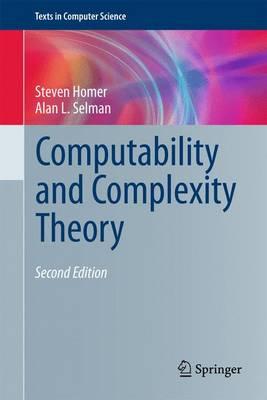Full Product Details
Author: Steven Homer ,
Alan L. Selman
Publisher: Springer-Verlag New York Inc.
Imprint: Springer-Verlag New York Inc.
Edition: 2nd ed. 2011
Dimensions:
Width: 15.50cm
, Height: 1.70cm
, Length: 23.50cm
Weight: 0.486kg
ISBN: 9781489989710
ISBN 10: 1489989714
Pages: 300
Publication Date: 03 March 2014
Audience:
Professional and scholarly
,
Professional & Vocational
Format: Paperback
Publisher's Status: Active
Availability: Manufactured on demand

We will order this item for you from a manufactured on demand supplier.
Reviews
From the reviews: The difference between this new introductory graduate textbook in theoretical computer science and other texts is that the authors have chosen to concentrate on computability theory and computational complexity theory. They motivate this focus by pointing out that most students have been introduced to the theory of automata and formal languages as undergraduates. The topics are treated in depth and in full formal detail. Explicit homework assignments are tightly integrated into the exposition of the material. --Computing Reviews This book is intended for use in a modern graduate course in the theory of computing. ... Mainly all old classical complexity results as well as a relatively recent result that space-bounded classes are closed under complements are included into the book. The textbook is self-contained. A list of useful homework problems is appended to each chapter. The book is well written and is recommended to students as well as specialists in theoretical computer science. (Anatoly V. Anisimov, Zentralblatt MATH, Vol. 1033 (8), 2004) This book is a solid textbook suited for one- or two-semester graduate courses on the theory of computing. ...The authors are two leading researchers in the field of theoretical computer sciences, most notably complexity theory. ... This textbook is an excellent resource and guide for those looking to develop a solid grounding in the theory of computing. Beginning graduates, advanced undergraduates and professionals involved in theoretical computer science, complexity theory and computability will find this book an essential and practical learning tool. (Andre Grosse, The Computer Journal, Vol. 45 (4), 2002)
From the reviews: The difference between this new introductory graduate textbook in theoretical computer science and other texts is that the authors have chosen to concentrate on computability theory and computational complexity theory. They motivate this focus by pointing out that most students have been introduced to the theory of automata and formal languages as undergraduates. The topics are treated in depth and in full formal detail. Explicit homework assignments are tightly integrated into the exposition of the material. --Computing Reviews This book is intended for use in a modern graduate course in the theory of computing. Mainly all old classical complexity results as well as a relatively recent result that space-bounded classes are closed under complements are included into the book. The textbook is self-contained. A list of useful homework problems is appended to each chapter. The book is well written and is recommended to students as well as specialists in theore




